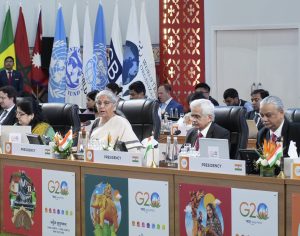Finance ministers from the Group of 20 nations meeting in India on Monday are poised to address critical global economic challenges, including the threats posed by climate change and rising debt among low-income countries.
India, which is hosting the global grouping, said the G-20 will focus on strengthening the global economy as growth remains uneven and below average.
“What we need are coordinated international efforts to navigate this challenging period,” India’s Finance Minister Nirmala Sitharaman said in her opening remarks ahead of the meetings being held in Gandhinagar, a city in the western Indian state of Gujarat.
Earlier on Monday, Sitharaman and U.S. Treasury Secretary Janet Yellen said the two countries were working together to further the group’s agenda. They spoke after holding talks on the sidelines of the G-20 meetings, a sign of the importance of their countries’ relationship at a time of tension with China.
“The world is looking to the G-20 to make progress on key challenges like climate change and pandemics as part of our work to strengthen the global economy and to support developing countries,” Yellen said.
Sitharaman said a priority for the G-20 and host India is strengthening global development banks and reaching a consensus on “intractable issues associated with rising indebtedness of low and middle-income countries.” Yellen added that it was vital to “press for more ambition and specific reforms” with respect to global development banks.
Both leaders emphasized the need to tackle debt issues facing low- and middle-income countries and to improve the multilateral debt restructuring process.
Sri Lanka and Ghana defaulted on their international debts in 2022, roughly two years after Zambia defaulted. And more than half of all low-income countries face debt distress, which hurts their long-term ability to function and develop.
The meetings of finance ministers and central bank governors will conclude on Tuesday.
A meeting of G-20 finance chiefs in India’s technology hub of Bengaluru in February ended without a consensus, with Russia and China objecting to the description of the war in Ukraine in a final document.
Yellen is back in India for the third time in nine months, this time soon after a trip to Beijing. She reiterated the deepening ties between the two countries on Monday and said “the United States and India are among the closest partners in the world.”
In a statement, she said the U.S. was looking forward to working with India on an “investment platform to deliver a lower cost of capital and increased private investment to speed India’s energy transition.”
India’s longstanding relationship with Russia has also loomed as the Kremlin’s invasion of Ukraine continues despite U.S. and allied countries’ efforts to sanction and economically bludgeon Russia’s economy. India has not taken part in the efforts to punish Russia and maintains energy trade with that country despite a Group of Seven-endorsed price cap on Russian oil, which has seen some success in slowing Russia’s economy.
Despite this, the U.S. has increased ties with India and courted its leaders. President Joe Biden hosted a White House state visit honoring Indian Prime Minister Narendra Modi in June, designed to highlight and foster their partnership. The two leaders pronounced the U.S.-India relationship never stronger and rolled out new business deals between the nations.

































